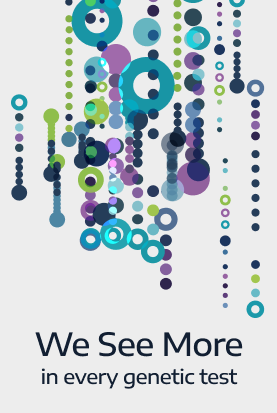Genomic Unity® Muscular Dystrophy Analysis
Genomic Unity® Muscular Dystrophy Analysis is a diagnostic test designed to identify genetic variants that cause muscular dystrophies.
- Test Description
- When to Order
- Included Genes
- Included Analyses
- Turnaround Time
- Sample Types
- CPT Codes
- Methods and Limitations
Test Description
Genomic Unity® Muscular Dystrophy Analysis is a targeted test that uses a whole genome platform to detect all major clinically relevant variant types from a single sample. This targeted test focuses on 52 genes associated with muscular dystrophies.
Genomic Unity® Muscular Dystrophy Analysis provides a single, unified clinical report that replaces a battery of tests including: targeted gene panel, single gene analysis and multiplex ligation dependent probe amplification (MLPA).
When to Order
Order this test when clinical symptoms of muscle weakness are present and consistent with congenital muscular dystrophies.
Included Genes
ANO5, B3GALNT2, B4GAT1, CAPN3, CAV3, CHKB, COL6A1, COL6A2, COL6A3, COL12A1, CRPPA, DAG1, DES, DMD, DNAJB6, DYSF, EMD, FHL1, FKRP, FKTN, GMPPB, HNRNPDL, ITGA7, LAMA2, LARGE1, LIMS2, LMNA, MYOT, PLEC, POMGNT1, POMGNT2, POMK, POMT1, POMT2, RXYLT1, SELENON, SGCA, SGCB, SGCD, SGCG, SMCHD1, SUN1, SUN2, SYNE1, SYNE2, TCAP, TMEM43, TNPO3, TOR1AIP1, TRAPPC11, TRIM32, TTN
Included Analyses
- Sequence analysis of muscular dystrophy-associated genes including: single nucleotide variants, deletions, insertions, and characterized intronic variants.
- Copy number variant analysis of muscular dystrophy-associated genes including: duplications/deletions, mobile element insertions, and inversions.
Optionally includes:
- Reflex to Genomic Unity® Exome Analysis, Genomic Unity® Exome Plus Analysis, or Genomic Unity® Whole Genome Analysis.
- Genomic Unity® Pharmacogenomics Analysis.
Turnaround Time
A report will be issued within 4 weeks. Turnaround time begins when samples and all required documents and approvals are received.
CPT Codes
81161, 81404, 81405, 81406, 81407, 81408, 81443, 81479
The CPT codes provided are for informational purposes only. CPT coding is the sole responsibility of the billing party. Please direct any questions regarding coding to the payer being billed.
Methods and Limitations
Genomic Unity® Muscular Dystrophy Analysis uses a PCR-free whole genome sequencing (WGS) platform paired with our Genomic Intelligence® analytical software.
SNVs:
99.9% sensitivity
99.9% specificity
99.8% positive predictive value
Structural variants:
96% clinical sensitivity
Test limitations:
The TTN gene contains regions that are non-unique, therefore not all variants can be assigned to the correct location, limiting interpretation.
